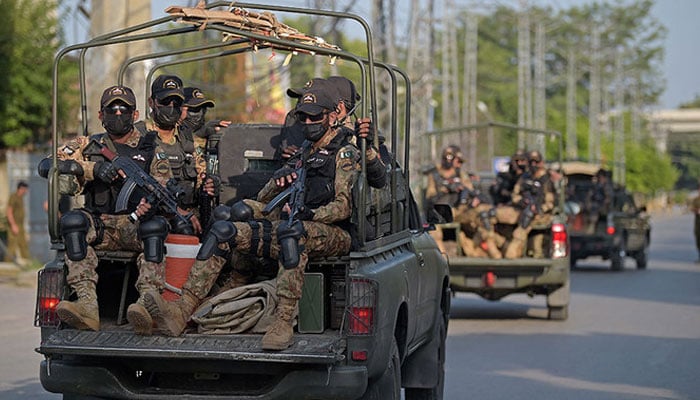ATA amendment
Vague criteria and lack of checks effectively create a legal pathway for arbitrary detention
The proposed amendment to Pakistan’s Anti-Terrorism Act (ATA) of 1997, granting security forces the authority to detain individuals suspected of terrorism for up to three months, can be seen as a troubling shift in the balance between national security and civil liberties. While there is no denying the importance of robust counterterrorism measures in times of heightened threats, laws that allow indefinite detention based on suspicion alone are fundamentally at odds with the principles of justice and accountability. The amendment – Section 11EEEE – expands preventive detention powers without civilian or judicial oversight, permitting the detention of individuals based solely on ‘reasonable suspicion’ – a scenario that dangerously undermines constitutional rights, including the right to due process. While proponents argue that these measures are necessary for preemptively curbing terrorism, the vague criteria and lack of checks effectively create a legal pathway for arbitrary detention.
Pakistan’s legal framework already provides for various counterterrorism measures, and the question is: has the government tried to first strengthen existing law enforcement systems? For instance, the police, who serve as the first line of defence in counterterrorism, often operate under severe resource and training constraints. Rather than bypassing these crucial institutions with expanded detention powers, the state would do better to bolster the capacity and accountability of law enforcement, equipping them to handle counterterrorism effectively within a transparent framework. Empowering the police and ensuring they have the necessary resources, training, and stability would go a long way in addressing security concerns, without jeopardising citizens’ rights. Laws granting preventive detention powers, even when intended as temporary or extraordinary measures, rarely stay limited in scope. Such laws, particularly when implemented without judicial oversight, pose a serious threat to fundamental rights. The risk of these detentions becoming a tool of political control cannot be overlooked, especially given Pakistan’s history of executive overreach.
While the amendment cites security needs as its rationale, the logic of sacrificing due process for preventive detention is flawed. Far from establishing peace, laws that erode fundamental rights and facilitate arbitrary detention often fuel resentment and mistrust among the public. They compromise the very freedoms that democratic societies are meant to protect and, in the process, weaken the legitimacy of the state itself. Pakistan’s response to rising terrorist threats should not compromise rule of law. Rather, it should involve creating a legal framework that upholds international human rights standards while enabling effective counterterrorism. Adopting such standards would include clearly defining criteria for detention, instituting robust checks and balances, and mandating regular judicial review. Ultimately, preventive detention laws may appear effective in the short term, but there are legitimate concerns that they could set a precedent that undermines democracy. True security cannot be achieved by diminishing the rights and freedoms of the people it is meant to protect. That said, it is also dangerous to ignore the rising terror threat in the country, which is and should be a very serious concern for all of us: what we need is a fine balance between ensuring citizens’ safety and civil liberties.
-
 World Economic Forum CEO Borge Brende Steps Down Following Jeffrey Epstein Ties Controversy
World Economic Forum CEO Borge Brende Steps Down Following Jeffrey Epstein Ties Controversy -
 Prince Harry's Ex Chelsy Davy Makes Special Announcement
Prince Harry's Ex Chelsy Davy Makes Special Announcement -
 Dominic Evans Speaks Out After Being Accused Of Being Involved In Nancy Guthrie Kidnapping
Dominic Evans Speaks Out After Being Accused Of Being Involved In Nancy Guthrie Kidnapping -
 AI Doomsday By 2028? New Study Warns Of Global Social, Economic Disruption & ‘ Intelligence Crisis’
AI Doomsday By 2028? New Study Warns Of Global Social, Economic Disruption & ‘ Intelligence Crisis’ -
 Do Sophie And Benedict Bridgerton Get Married As Netflix Show Returns For Season 4 Part 2?
Do Sophie And Benedict Bridgerton Get Married As Netflix Show Returns For Season 4 Part 2? -
 Prince William Reveals He's 'a Little Biased' Toward One Hollywood Star
Prince William Reveals He's 'a Little Biased' Toward One Hollywood Star -
 Meghan Markle, Prince Harry Visit Special Charity On Final Day Of Jordan Trip
Meghan Markle, Prince Harry Visit Special Charity On Final Day Of Jordan Trip -
 Natalie Dormer's Reaction To Sarah Ferguson's Epstein Links Resurfaces After 'The Lady' Release
Natalie Dormer's Reaction To Sarah Ferguson's Epstein Links Resurfaces After 'The Lady' Release -
 Did You Know Famous Windows 10 Background Was Shot In Real Life? Here's Story
Did You Know Famous Windows 10 Background Was Shot In Real Life? Here's Story -
 Pete Davidson's Baby Mommy Elsie Hewitt Reveals Why She 'hated' Being Pregnant
Pete Davidson's Baby Mommy Elsie Hewitt Reveals Why She 'hated' Being Pregnant -
 Harry, Meghan Show Royal Family How To Make Impact Without Public Money
Harry, Meghan Show Royal Family How To Make Impact Without Public Money -
 Hillary Clinton Set For Deposition Before House Committee Today In Jeffrey Epstein Investigation Case
Hillary Clinton Set For Deposition Before House Committee Today In Jeffrey Epstein Investigation Case -
 Samsung Galaxy S26 Ultra Debutes With Display That Blocks Side Viewers
Samsung Galaxy S26 Ultra Debutes With Display That Blocks Side Viewers -
 Fans In Shock As 'Smiling Friends' Creators End Cult-favourite Sitcom On Adult Swim: 'They Did It On Purpose'
Fans In Shock As 'Smiling Friends' Creators End Cult-favourite Sitcom On Adult Swim: 'They Did It On Purpose' -
 Meghan Markle Accused Of Mimicking Kate’s Iconic Style On 'pseudo Royal Tour'
Meghan Markle Accused Of Mimicking Kate’s Iconic Style On 'pseudo Royal Tour' -
 Social Media Addiction ‘like Smoking’: Mumsnet Calls For Under-16s Ban With Cigarette-style Warnings
Social Media Addiction ‘like Smoking’: Mumsnet Calls For Under-16s Ban With Cigarette-style Warnings




